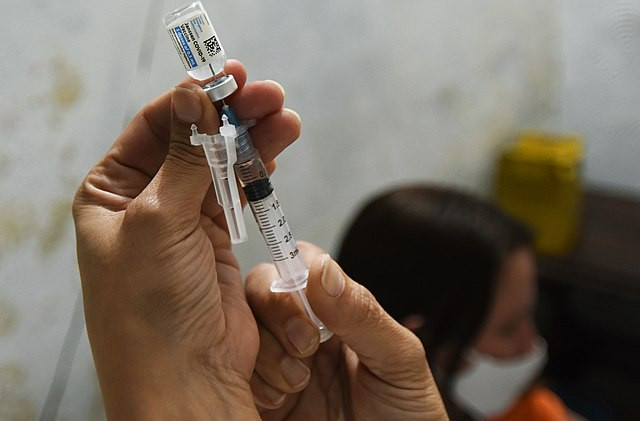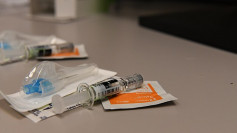The Food and Drug Administration announced sweeping changes to its COVID-19 vaccine policy Tuesday, signaling a major departure from universal booster recommendations and shifting toward targeted protection for high-risk populations. Under the revised approach, healthy children and adults will no longer be automatically eligible for updated vaccines each year, with new doses requiring large-scale, placebo-controlled trials before being approved for use in lower-risk groups.
FDA Commissioner Dr. Marty Makary and Dr. Vinay Prasad, the agency's newly appointed vaccine chief, detailed the overhaul in a joint article published in The New England Journal of Medicine. "The FDA's new Covid-19 philosophy represents a balance of regulatory flexibility and a commitment to gold-standard science," they wrote. "The FDA will approve vaccines for high-risk persons and, at the same time, demand robust, gold-standard data on persons at low risk."
The revised guidance coincides with Thursday's scheduled meeting of the FDA's vaccine advisory committee, which is expected to recommend virus strains for inclusion in the next formulation of COVID-19 shots. Drugmakers Pfizer and Moderna will likely be unable to complete the required trials in time for the fall season, raising uncertainty about the availability of boosters for the broader population.
According to Makary and Prasad, updated vaccines for adults 65 and older and individuals with underlying health conditions-such as obesity, diabetes, heart disease, pregnancy, asthma, or depression-will continue to be approved under smaller, immunogenicity studies. The FDA estimates that between 100 million and 200 million Americans will remain eligible under this framework.
However, for healthy individuals outside those categories, future access to COVID-19 vaccines will depend on the completion of new six-month clinical trials demonstrating at least 30% effectiveness in preventing symptomatic illness. The agency emphasized that prior infection with COVID-19 should not exclude individuals from these trials, to better reflect the general population.
Critics have raised concerns that the policy bypasses the standard process used by the CDC's Advisory Committee on Immunization Practices (ACIP) to determine vaccine eligibility. "It is not clear why there was a compelling reason for FDA to step in and preempt that usual and publicly transparent consultative process," Dr. Jesse Goodman, former FDA chief scientist and now a professor at Georgetown University, said in a statement.
Others warned the move could restrict access for individuals who wish to be vaccinated to protect vulnerable loved ones. "What about people who are not at increased risk of severe disease who want to reduce their risk of infection or time off from work?" Goodman asked.
During a public Q&A Tuesday, Prasad dismissed such concerns, stating, "There is no high quality evidence that you getting a booster to visit your grandma protects your grandma."
The decision comes amid intensifying scrutiny of vaccine policy under Health and Human Services Secretary Robert F. Kennedy Jr., who has long criticized immunization programs. In 2021, Kennedy called the COVID vaccines "the deadliest vaccine ever made" and filed a petition requesting the FDA revoke their emergency authorization. At a Senate committee hearing last week, Kennedy incorrectly claimed COVID shots were the only vaccines tested against a placebo-a statement later refuted by Sen. Bill Cassidy (R., La.), who cited similar trials for HPV, measles, and rotavirus.
Over the weekend, the FDA approved Novavax's updated vaccine but limited its use to those aged 65 and up or people with qualifying health conditions, sparking further debate about whether HHS is delaying or limiting vaccine access. Former CDC officials warned that the policy shift, if adopted by insurers, could lead to higher out-of-pocket costs for many Americans.
Michael Osterholm, director of the Center for Infectious Disease Research and Policy at the University of Minnesota, said the change violated Kennedy's stated position. "Secretary Kennedy had made it clear that he would never take vaccines away from anyone. This violates that in every way possible," he said.
Dr. Paul Offit, director of the Vaccine Education Center at Children's Hospital of Philadelphia, expressed ethical concerns over conducting placebo-controlled trials in healthy individuals. "I don't think it's ethical, given that we have a vaccine that works, given that we know that SARS-CoV-2 continues to circulate and cause hospitalizations and death, and there's no group that has no risk," he said.
Dr. Peter Hotez of Baylor College of Medicine also criticized the decision. "COVID vaccines should be made available to all age groups," he said, pointing to growing data that long COVID can affect healthy individuals, including children.
Prasad defended the policy shift, arguing that "we simply do not know the answer" about whether most Americans need continued boosters. "The truth is that for many Americans, we simply do not know the answer to whether or they should be getting a seventh or eighth or ninth or 10th COVID-19 booster," he said.






